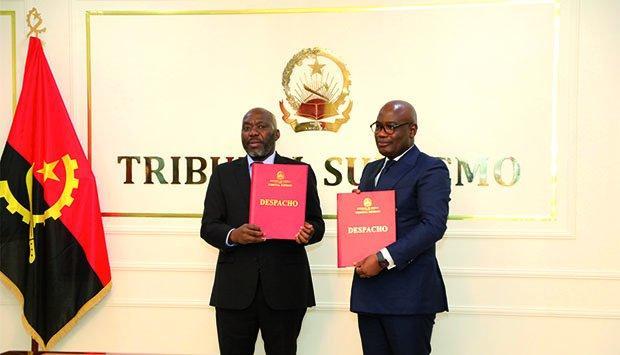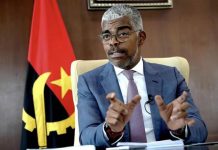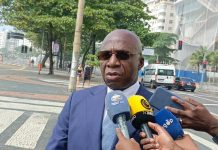Africa-Press – Angola. The Supreme Court (TS) and the Financial Information Unit (UIF) signed, yesterday, in Luanda, a document in which they commit to supporting initiatives to exchange information on irregularities occurring in the context of combating money laundering and terrorist financing and the proliferation of weapons of mass destruction.
The document was initialed by the presiding judge of the TS, Joel Leonardo, and by the general director of the UIF, Gilberto Capeça.
Joel Leonardo highlighted, on the occasion, that the initiative marks the materialization of one of the principles that guide the Judiciary in the country, which is “exactly” to collaborate in the field of separation of powers and interdependence of functions with other bodies, for a Justice with greater fluidity of information.
“The phenomenon linked to combating legal or criminal crimes, to enable the prevention and combat of illicit financial flows, does not act in isolation. However, it works within the framework of a system. Therefore, we, the courts, are constitutionally included in this system “, he said.
Everything that concerns improving the performance of the Supreme Court, added Joel Leonardo, must be received in the best possible way.
“The Financial Information Unit has a safe partner. We will do whatever we can to ensure that we implement the clauses contained in this protocol, and that it will not be limited to this meeting, but rather, on the contrary, will facilitate what you want our citizens, and our institutions, provide a service for the stability of the country’s economy and the improvement of citizens’ lives”, he highlighted.
For the general director of the UIF, Gilberto Capeça, the agreement presupposes, in practice, that the institution will start issuing financial information to the Court about irregularities and “non-investigation”, clarifying that, when carrying out due diligence, it should be necessary to go the search for information from the judicial body, to support the action.
Gilberto Capeça clarified that the Supreme Court will become, in this case, “one of the sources that can guarantee us this type of information, because if we carry out due diligence and report a case of suspicious operation to a law enforcement entity, we have We must do so with the necessary security so that the information is truthful.”
“We want to say here that it is in this information exchange protocol where we frame this aim”, highlighted the UIF general director.
The signing of the technical assistance protocol between the FIU and the Supreme Court, he said, constitutes a “crucial” step towards strengthening, not only the collaboration between the institutions that are part of the National System for the Prevention and Combat of Money Laundering, the Financing of Terrorism and the Proliferation of Weapons of Mass Destruction.
“By initialing the cooperation instrument, we are taking great strides towards reducing a set of strategic deficiencies identified in our system, during the mutual evaluation of Angola”, he assured.
Gilberto Capeça also mentioned that the document demonstrates the commitment of the various organizations in reinforcing one of the highly important pillars in the system, relating to the alignment of statistical data, arising from final and unappealable processes, or others, which are found in the various trial phases.
The same statistical data, he continued, also includes those in the appeal phase, as long as they involve the crimes of money laundering, terrorist financing and the proliferation of weapons of mass destruction and the undoubted exchange of information, as well as training of staff from both institutions in these matters.
The director general of the UIF also highlighted that the Court, as the highest instance of common jurisdiction of the Angolan State, plays a “high” important role in the national architecture for preventing and combating money laundering in the country.
“This exercise increasingly reaffirms the interest and commitment of the Angolan Executive in preventing and combating money laundering, terrorist financing and all financial crime underlying these, as well as strengthening this system in alignment with good international practices about the matter,” he said.
The Financial Information Unit, recalled Gilberto Capeça, has already initialed agreements with other entities, namely the Attorney General’s Office and the General Tax Administration (AGT), the latter body overseen by the Ministry of Finance, responsible for collecting revenue for the State and the customs control.
“The Supreme Court was missing from this chain. We closed the cycle of exchanging information with law enforcement agencies,” he stated.
At a time when the implementation of a set of actions and measures recommended in the Angolan Mutual Assessment Report is underway, to strengthen national systems, he said, signing the protocol with the Supreme Court will also allow the FIU to have knowledge of a set of information to strengthen statistics.
Cooperation will facilitate the introduction of cases into trial
The protocol, according to the director general of the FIU, will make it easier for the cases under trial to include the crimes of money laundering and terrorist financing, the necessary contributions to have effective convictions, as well as the staff of both institutions to be able to improve knowledge of the most varied subjects, “the result of which is predicted to be nothing other than the best”.
Asked about the situation of terrorist financing in Angola, Gilberto Capeça replied: “The national risk assessment carried out in the country, from 2017 to 2019, had results, which are public. We can assure you that we are doing well. We have few, we have no cases of terrorist financing in Angola. We have cases of money laundering associated with its underlying crimes, which are corruption and drug trafficking”, he concluded.
The Financial Information Unit consists of a national central organization of a public, autonomous and independent nature, with competence to receive, analyze and disseminate information suspected of money laundering, terrorist financing and the proliferation of weapons of mass destruction.
The institution cooperates with international counterparts and other competent entities to prevent and combat money laundering, financing of terrorism and the proliferation of weapons of mass destruction, whose organization and functioning is defined in its own diploma, as provided for in article no. 42, of article 3 in conjunction with article 61, both of Law no. 05/20, of 27 January.
jornalde angola
For More News And Analysis About Angola Follow Africa-Press






